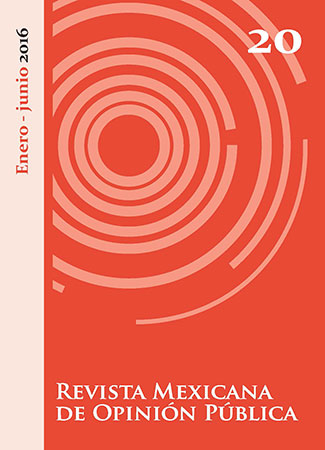Culture of Lawfulness in Violence Contexts. Hagámoslo Bien Phenomenon in Monterrey
Main Article Content
Abstract
To analyze peacebuilding processes in scenarios of violence is both interesting and complicated. One way to do it is through the knowledge of how communions and convergences among actors occur in favor of peaceful scenarios. The article analyzes the creation and development of Hagámoslo Bien, a citizens' initiative in the city of Monterrey, Nuevo León, designed and implemented in order to counter the wave of violence and insecurity that the city went through, particularly in 2011. The exercise is based on the Social Network Analysis technique, which allows to graph, to measure and analyze the quantitative and qualitative construction and dynamic nature of Hagámoslo Bien as a huge peacebuilding network in Monterrey, designed to disseminate and promote a culture of lawfulness as a means to reach peace in this city. The article begins documenting the context in which the initiative arises, identifies its key players and then explains qualitatively and quantitatively the size and nature of the network, recognizing, as part of its conclusions, the importance of involving the right actors in such adverse situations, to promote projects of this nature, also addressing its challenges towards the future.
Article Details
References
AGUIRRE, Julio Leónidas, “Introducción al Análisis de Redes Sociales”, Documentos de trabajo CIEPP, núm. 82, Centro Interdisciplinario para el Estudio de Políticas Públicas, Buenos Aires, 2011.
CRESPO, José Antonio, “Hacia una cultura de la legalidad”, Revista Nueva Antropología, vol. XI, núm. 38, UNAM, México, octubre de 1990.
GODSON, Roy, Guía para desarrollar una cultura de la legalidad, The Sicilian Renaissance Instituto/United Nations Office for Drug and Crime, Roma, 2000.
GRANOVETTER, Mark S., “The Strength of Weak Ties”, American Journal of Sociology, vol. 78, núm. 6, University of Chicago, Chicago, mayo de 1973, pp. 1360-1380.
HAGÁMOSLO BIEN, “Firma del pacto”, en sitio web de Hagámoslo Bien, México, s/f. Consultado el 10 de abril de 2015 en http://www.hagamoslobien.org/?page_id=19.
HAGÁMOSLO BIEN, Información general sobre Hagámoslo Bien, Hagámoslo Bien, Monterrey, 2015.
HANNEMAN, Robert A., “Introducción a los métodos de análisis de redes sociales”, versión en español en Revista hispana para el análisis de redes sociales REDES, Universidad Autónoma de Barcelona y Laboratorio de redes personales y comunidades, España, octubre de 2000.
INEGI, “Delimitación de las Zonas Metropolitanas de México 2010”, México, SEDESOL/INEGI/CONAPO, México, 2010. Consultado el 12 de marzo de 2015 en http://www.inegi.org.mx/Sistemas/multiarchivos/doc/702825003884/DZM20101.pdf.
LOZARES, Carlos, “La teoría de redes sociales”, Papers. Revista de Sociología, núm. 48, Universidad Autónoma de Barcelona, Barcelona, 1996, pp. 103-126.
MITCHELL, James Clyde (ed.), “The Concept and use of social Networks”, Social Networks in Urban Situations: Analyses of Personal Relationships in Central African Towns, University of Manchester, Mánchester, 1969.
ORLANDO, Leoluca, Hacia una cultura de la legalidad. La experiencia siciliana, UAM/SSPDF, México, 2005.
PUTNAM, Robert D., Bowling Alone: The Collapse and Revival of American Community, Simon & Schuster, Nueva York, 2000.
PUTNAM, Robert D., Robert Leonardi y Raffaella Y. Nanetti, Para que la democracia funcione. Tradiciones cívicas en Italia, Galas, Caracas, 1994.
Entrevistas
PEÑA GONZÁLEZ, Rodrigo “Entrevista con Beatriz Naibi León Ramos, facilitadora en temas de cultura de la legalidad en México Unido Contra la Delincuencia A. C.”, 24 de marzo de 2015.
PEÑA GONZÁLEZ, Rodrigo, “Entrevista con Francisco Suárez, director de Asuntos Corporativos en Coca Cola FEMSA”, 31 de marzo de 2015.
PEÑA GONZÁLEZ, Rodrigo, “Entrevista con María Teresa Troncoso de Venguer, directora de Cultura de la Legalidad de México Unido Contra la Delincuencia A. C.”, 26 de marzo de 2015.
PEÑA GONZÁLEZ, Rodrigo, “Entrevista con Rafael Ibarra Farfán, coordinador de enseñanza del programa de Cultura de la Legalidad en México Unido Contra la Delincuencia A. C.”, 26 de marzo de 2015.

Revista Mexicana de Opinión Pública por Universidad Nacional Autónoma de México se distribuye bajo una Licencia Creative Commons Atribución-NoComercial-SinDerivar 4.0 Internacional.
Basada en una obra en http://revistas.unam.mx/index.php/rmop.
